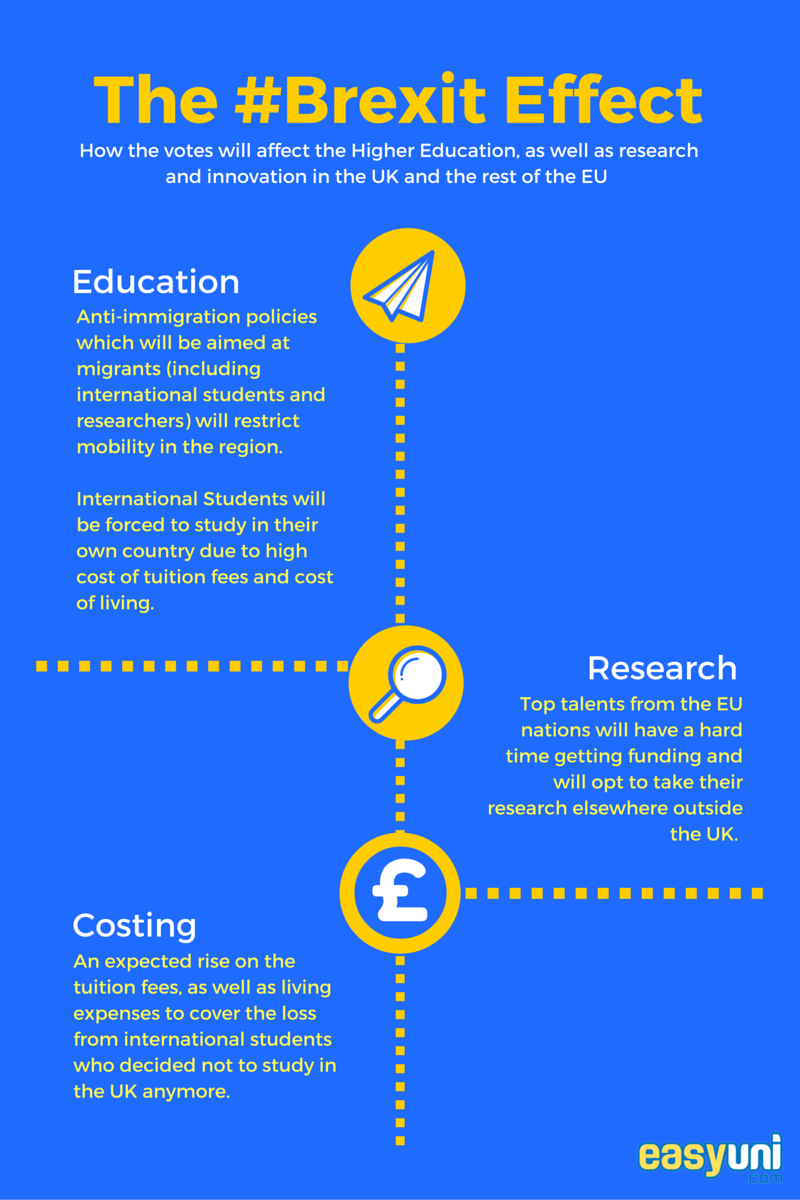Higher Education Post #Brexit: What Now?
November 11, 2017
EasyUni Staff
Last week saw a big change in the European Union (EU) as the United Kingdom (UK) has decided to depart from the EU. With a small margin, the 'Leave' votes won over the 'Remain', with 52% and 48% votes respectively.

The result will surely affect various sectors not just in the UK, but also in the whole of the EU, should the decision and the negotiation be finalised. One of the industries that will be shaken by this split will be the higher education. But as to what extent?
Higher Education before #Brexit
The UK has always been a hotspot for international students. Currently it is the 2nd most popular destination for international students according to UNESCO and QS World Rankings. There are currently 400,000 foreign students studying in the UK. In addition, it has attracted migrants from various EU countries, registering the highest number of university-educated migrants than any other nation in the region.
This means the higher education industry contributes greatly to the country’s economy. Just think about the amount of money spent on tuition fees as well as non-academic expenditures throughout their stay.
Not only that, these migrants have contributed so much to the British economy. In fact, a study published by University College London (UCL) stated that “European immigrants who arrived in the UK since 2000 have contributed more than £20bn to UK public finances between 2001 and 2011.”

The quality of the UK’s research and innovation facilities have also brought in talents from across the EU. Scientists, not just from the region, come to the UK to further improve their reputation and to take advantage of the advanced centres and work with well-established institutions in the country. While the funding is from their country of origin, their talents are well-utilised by the UK during their stay.
How will #Brexit Affect the Higher Education?
While the decline in numbers and the slow growth of the population of foreign students studying in the UK have been felt even before #Brexit, the changes after the decision to leave the EU will significantly affect the sector, most especially those who are under the research.
With the anti-immigration policies to be in effect soon, there might be a lesser number of students coming to the UK to further their studies. With the high costs of studying to compensate the loss of international students, plus living expenses, not to mention the devaluation of Pound, the effect to both the local and the international students will be tremendous. Further to this, students from the EU-member nations will feel the restrictions as the movement from their country to the UK will not be as easy as before.
Before the voting, Prof Michael Arthur, president and provost of UCL has already warned that a #Brexit vote will result in the loss of tens of millions of pounds, leading to European students who will no longer be able to pay for exorbitant fees.
In an interview with The Guardian, he said, “It’s difficult to imagine a government that’s just exited from Europe wishing to continue the loan scheme [for EU students].” He added that those who might no longer have access to the loan system have a choice to either pay full international fees or go back and study for a lower fee or no cost at all.
“It’s my view that we will lose a significant proportion of the undergraduates, and that could be quite negative,” he said.
There is also a fear of losing top quality talents from outside the UK. As the funding gets more difficult to take place in a non-EU nation, researchers and innovators will opt to find opportunities elsewhere despite the technology available in the UK.

“The ease with which we can attract scientists from other EU member states has been critical in keeping the UK among the global elite, not only at senior and post-doctoral levels, but also in the competition for Ph.D. positions,” said Stephen Moss, Professor of biomedical research at UCL. In an article published last year in The Guardian, he said, “for many postgraduate schemes, EU nationals would become ineligible if Britain were to leave the union.”
As for British students, there is also uncertainty in various education programmes, such as the Erasmus Exchange and Scholarship Programme. For years, it has enabled cross-border cooperation between the EU states to allow students to study and work overseas. With the recent developments in the EU, Erasmus Programme "is not clear at this early stage what the impact of the recent UK vote to leave the EU" will have on the programme.
While the effects may still be unclear to both the United Kingdom and the rest of the European Union, the fact that the quality of education, research, and innovation, as well as the quantity of excellent talents will be restricted with the recent #Brexit developments. Measures must be taken to lessen the impact of this decision to the higher education industry so as not to compromise the value of higher education learning in the region.
You might be interested in...
- Top Private Universities in Malaysia (QS Rankings 2026)
- APU and GUT Launch New Tech College in China: Earn Dual Degrees
- Global Learning at the Crossroads: Canada–Malaysia’s Evolving Education Partnership
- How AI is Powering the Next Wave of MSME Growth in Malaysia
- Malaysian Private Universities Making a Mark in Global Rankings
- Benchmarking Malaysian Private Universities Against Their ASEAN Peers
- Step-by-Step Guide to Applying to Malaysian Universities Online in 2025
- Fastest-Rising Malaysian Universities in the QS Rankings (2023‑2025)
- Sunway University Climbs to Global Top 500 in QS Rankings 2026
- Trusted by Top Universities: EasyUni’s Exclusive Visit to Sunway University
 +60173309581
+60173309581





